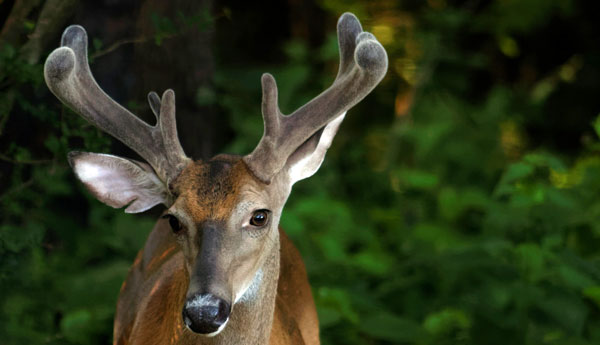
Whether you want to keep the deer from eating all your garden vegetables and flowers or whether you’re interested in ways to help wildlife during a hot, dry summer, here are a few things you should know.
Any limited availability of food and water can lead to a reduced number of newborn fawns and fewer fawns that survive their first year. Such harsh conditions can also reduce the number of huntable bucks, and result in lower overall deer-population numbers. Drought can even impact antler growth for buck deer because a sparse food supply provides fewer nutrients, which bucks need to grow antlers. Pregnant does also struggle with the decreased food supply during drought years, and if their body condition is poor during pregnancy, their male offspring may have relatively smaller antlers, even after reaching maturity. As such, your garden is likely to look mighty tempting.
Reducing Garden Conflicts with Deer
In order to find alternate food sources, deer and other big-game animals may end up in people’s yards or gardens this summer. If you want to try to save your plants and want to minimize any property damage from these wildlife visits, here are a few tips:
- Building an eight-foot fence around your garden or yard is the most effective method, and is often the only reliable way to keep deer out.
- A motion-activated sprinkler can also prove an effective deterrent, soaking unwanted intruders.
- Planting unpalatable vegetation around the perimeter of your garden can sometimes discourage deer from foraging further.
Of course, these are two sides to this particular coin. If you want to keep the deer out of your yard, its not a terrible idea to try to help them out in other ways. After all, there are many benefits to a healthy deer population. Contrary to what you may think though, this does not mean feeding the deer, no matter how tempting.
“The best way you can help wildlife is by letting animals stay wild,” according to Utah Division of Wildlife Resources wildlife section chief Covy Jones. “Don’t approach them, and don’t try to feed them. These animals have evolved to be able to survive numerous weather conditions and to make it on their own. Often people’s good intentions wind up doing more harm than good for the wildlife. It can also be really dangerous when deer, moose or bears become habituated and lose their fear of people.”
A humble homesteader based in an undisclosed location, Lars Drecker splits his time between tending his little slice of self-sustaining heaven, and bothering his neighbors to do his work for him. This is mainly the fault of a debilitating predilection for fishing, hunting, camping and all other things outdoors. When not engaged in any of the above activities, you can normally find him broken down on the side of the road, in some piece of junk he just “fixed-up.”

Larry C says
I keep a small garden as live away from town. In my area of the state I am allowed 6 deer tags. That garden fills up my deep freezer with venison. I do not need to go more than 2 steps from the house to fill my tags. Some of the needy folks around here also benefit from my deep freezer. Probl;em solved!
Jim says
U of GA recommends a double fence. Not expensive and works, at least for me around Dewy Rose, GA. check their website
Kimberpross says
I plant favorable brows for deer away from my garden. It seems to work some but they still like to selectively munch on some of my plants elsewhere.